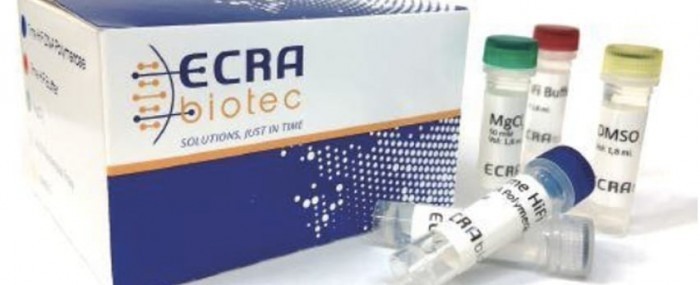
Academia-business partnership stimulates local production of inputs for key COVID-19 diagnostic test
19 de maio de 2020By Elton Alisson | FAPESP Innovative R&D – The real-time reverse transcription polymerase chain reaction test (RT-PCR), considered the gold standard for COVID-19 diagnosis, has hardly been used in Brazil to date, mainly owing to a worldwide shortage of the requisite reagents, all of which have to be imported.
To reduce Brazil’s dependence on imports and help increase the availability of RT-PCR testing nationwide, researchers at the University of Campinas (UNICAMP) in the state of São Paulo are producing raw materials and establishing protocols for the use of reagents produced by local biotech startups in COVID-19 diagnostic testing by this method at the institution.
“We want to be able to use reagents and other inputs produced in Brazil in all stages of the real-time RT-PCR test,” André Schwambach Vieira, a professor in UNICAMP’s Biology Institute, told FAPESP Innovative R&D. Vieira is a member of the task force set up by faculty at UNICAMP to combat the novel coronavirus SARS-CoV-2.
Real-time RT-PCR is a molecular test that detects viral genetic material in nasal mucus and throat secretions. It has been widely used in Germany, South Korea and other countries seen as having controlled the COVID-19 pandemic with a fair degree of success.
The test is key to control because it can detect the virus early on in the infection, between the third and seventh day after symptoms first appear, and subjects who test positive can be isolated sooner in order to reduce transmission. Serological tests detect antibodies to verify immune response and are efficient only at a later stage – from the eleventh day after symptoms appear.
Nasal and throat secretions are collected using a swab, a long-stemmed sterile nylon or rayon bud, but even this basic input is hard to find on the market because so many countries are seeking to buy test kits or materials at the same time, Vieira explained.
Braskem, the leading producer of plastic resins in Brazil, has told the researchers it is willing to study a way of producing swabs locally. “We’ve had a few meetings with representatives of the company, who promised to analyze the feasibility of producing the swabs needed for RT-PCR testing in Brazil,” Vieira said.
The swabs with the samples of secretion are placed in saline solution and sent to diagnostic laboratories where they are submitted to several procedures for extraction and purification of viral RNA. This processing entails elimination of the virus’s protein capsid shell, as well as other proteins and enzymes present in every sample.
“Viral RNA purification is a critical stage because it ensures the highest possible level of test sensitivity and reproducibility,” Vieira said.
Performing thousands of RT-PCR tests quickly and simultaneously to diagnose COVID-19 requires the use of NanoBiT, a proprietary protein detection technology for RNA extraction involving imported kits that are also in short supply owing to excess demand.
A group of researchers in UNICAMP’s Chemistry Institute led by Professor Ljubica Tasic have successfully synthesized magnetic microparticles for viral RNA extraction and purification.
When the RNA comes into contact with the silicate-coated magnetite microparticles, it interacts with them electrostatically and is absorbed by the silicate. The particles are rinsed and the viral RNA is extracted for PCR testing.
“We tested the particles with viral and bacterial RNA. The results were very good. If all goes well, we’ll be able to use the particles to do several tests simultaneously,” Tasic said.
The quantity of magnetic particles produced by the researchers is sufficient for 10,000 extractions of RNA from the novel coronavirus. They plan to scale up production from now on.
Import substitution
“Now we have a substitute for the imported product to extract and purify RNA,” Tasic said.
The UNICAMP researchers have also succeeded in substituting imported enzymes, primers and probes used in the stages of RT-PCR testing after RNA extraction and purification.
Partnering with startups Ecra Biotec and Exxtend, they validated the reagents produced by the two firms in accordance with the protocol for RT-PCR testing to diagnose COVID-19 issued by the World Health Organization (WHO), Vieira said.
Both startups were supported by FAPESP’s Innovative Research in Small Business (PIPE) Program.
“We’d already used reagents produced by these firms in previous research projects. In response to the COVID-19 pandemic we decided to compare them with imported products to see if the quality and efficiency are the same. The results were very positive,” Vieira said.
Reverse transcriptase enzymes developed by Ecra Biotec with the support of PIPE-FAPESP are used to copy RNA from SARS-CoV-2 back to DNA.
“We did a series of tests to compare them with currently marketed enzymes and they performed better,” said Fábio Trigo Raya, Ecra Biotec co-founder and partner.
Exxtend produces primers and probes, short DNA sequences that help amplify and detect viral genetic material in samples.
If the virus is present in the sample, its genetic material is replicated thousands of times, and light emitted by fluorescent molecules bound to the DNA sequences is recorded by a laboratory sensor as a sign of infection. The intensity of this light can be used as an indicator of the number of viruses present in the patient.
“We have plans to expand our portfolio and produce a number of other inputs needed to support the development of diagnostic tests in Brazil,” said Paulo Roberto Pesquero, managing director of Exxtend.
